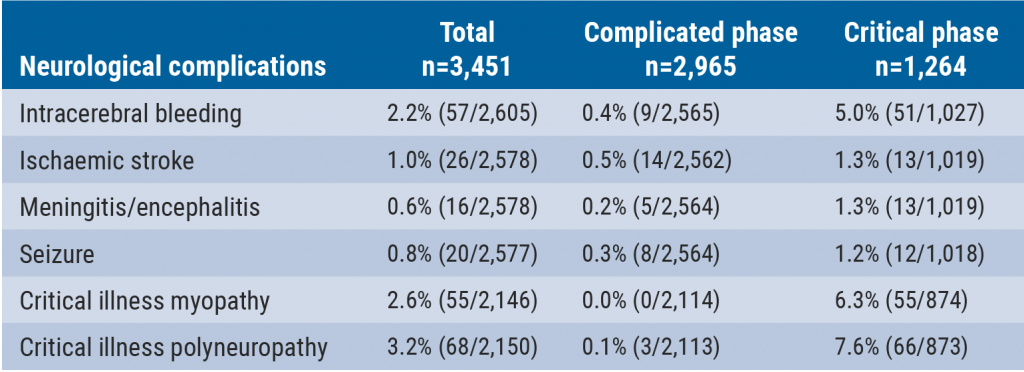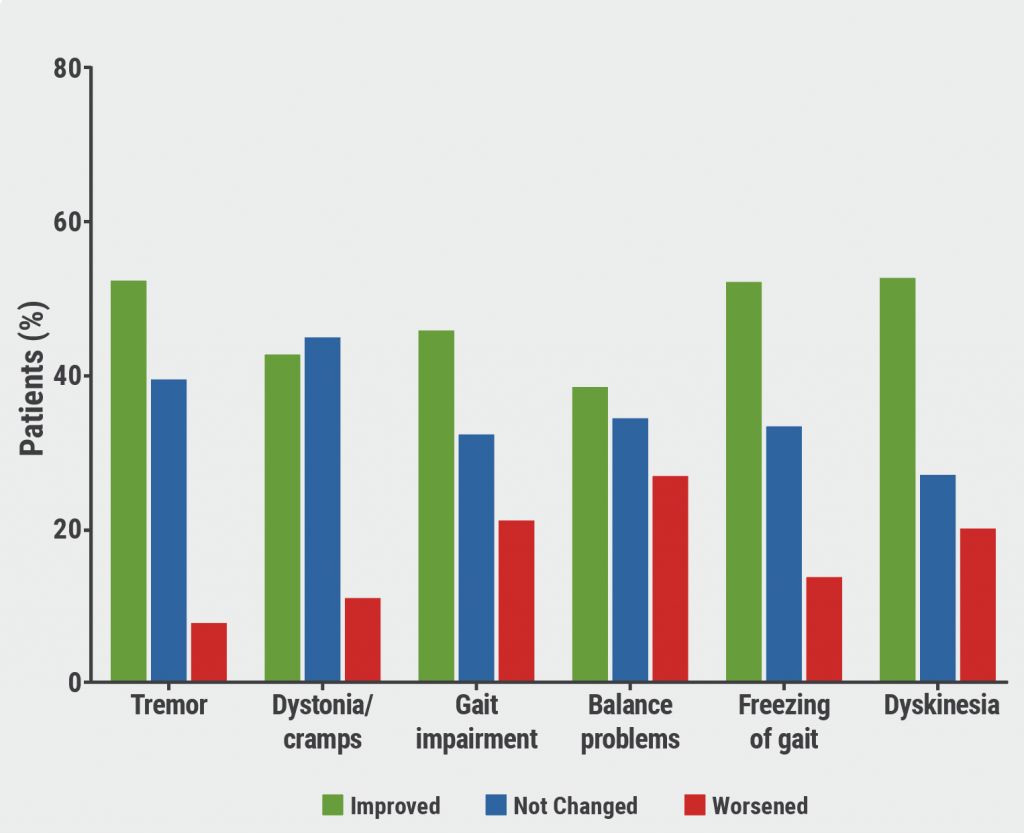Dr Nina Kleineberg (University Hospital Cologne, Germany) presented findings from the Lean European Open Survey on SARS-CoV-2-Infected Patients (LEOSS), based on data from 6,537 patients from 127 centres across Europe with a diagnosis of SARS-CoV-2 infection between January 2020 and February 2021 [1].
In total, 92.1% of patients in this cohort were hospitalised. More than half (54.4%) had ≥1 neurological symptom, 3.3% had a new neurological complication, and 18.1% had ≥1 pre-existing neurological comorbidities. The neurological manifestations (see Table 1) and complications (see Table 2) in this study were mostly in agreement with previously published data. Overall, 33.5% of patients had a complicated, and 19.4% a critical disease course. Total death rate was 14.7%. This was higher in patients with dementia (38.0%), movement disorders (32.8%), and prior cerebrovascular disease (32.3%). Age (OR 1.53), cardiovascular diseases (OR 1.74), muscle weakness (OR 1.40), pulmonary diseases (1.49), and male sex (OR 1.52) were associated with a significantly increased risk of a critical COVID-19 disease course, failed recovery, and death. Patients with pre-existing neuro-immunological diseases and prior cerebrovascular events did not seem to have an elevated risk of unfavourable outcome or complicated disease course. Most unspecific neurological symptoms at baseline were not associated with unfavourable short-term outcome. Headache may predict a favourable outcome. Excessive fatigue at baseline was associated with a higher risk of less favourable short-term outcome.
Table 1: Neurological symptoms of patients in LEOSS [1]

Table 2: Neurological complications of patients in LEOSS [1]

- Kleineberg N, et al. Neurological implications of COVID-19 – results of the LEOSS registry. OPR-056, EAN 2021 Virtual Congress, 19–22 June.
Copyright ©2021 Medicom Medical Publishers
Posted on
Previous Article
« Breast cancer screening at 40 aids childhood cancer survivors treated without chest radiation Next Article
Dexamethasone not indicated for chronic subdural haematoma »
« Breast cancer screening at 40 aids childhood cancer survivors treated without chest radiation Next Article
Dexamethasone not indicated for chronic subdural haematoma »
Table of Contents: EAN 2021
Featured articles
Letter from the Editor
COVID-19
First evidence of brainstem involvement in COVID-19
Cognitive/behavioural alterations persistent after COVID-19
Neural base of persistent hyposmia after COVID-19
Neurological symptoms and complications of COVID-19 affect outcomes
Cerebrovascular Disease
Intracerebral haemorrhage only slightly increases mortality in COVID-19 patients
Stroke with covert brain infarction indicates high vascular risk
Expanding precision medicine to stroke care
Dexamethasone not indicated for chronic subdural haematoma
Cognitive Impairment and Dementia
Severe outcomes of COVID-19 in patients with dementia
Promising diagnostic accuracy of plasma GFAP
Sex modulates effect of cognitive reserve on subjective cognitive decline
Hypersensitivity to uncertainty in subjective cognitive decline
Epilepsy
Minimally invasive device to detect focal seizure activity
‘Mozart effect’ in epilepsy: why Mozart tops Haydn
Migraine and Headache
Factors associated with decreased migraine attack risk
Pregnant migraine patients at higher risk of complications
Occipital nerve stimulation in drug-resistant cluster headache
Rhythmicity in primary headache disorders
Multiple Sclerosis and NMOSD
Typing behaviour to remotely monitor clinical MS status
Alemtuzumab in treatment-naïve patients with aggressive MS
No higher early MS relapse frequency after stopping ponesimod
Good long-term safety and efficacy of inebilizumab in NMOSD
Neuromuscular Disorders
Inability to recognise disgust as first cognitive symptom of ALS
Pathogenic T-cell signature identified in myasthenia gravis
Parkinson’s Disease
Levodopa-carbidopa intestinal gel in patients with advanced PD
New Frontier – Navigated Transcranial Ultrasound
Exploring the possibilities
Related Articles
August 18, 2021
Typing behaviour to remotely monitor clinical MS status
August 18, 2021
Erenumab superior to topiramate for migraine treatment

August 18, 2021
Levodopa-carbidopa intestinal gel in patients with advanced PD
© 2024 Medicom Medical Publishers. All rights reserved. Terms and Conditions | Privacy Policy
HEAD OFFICE
Laarderhoogtweg 25
1101 EB Amsterdam
The Netherlands
T: +31 85 4012 560
E: publishers@medicom-publishers.com

